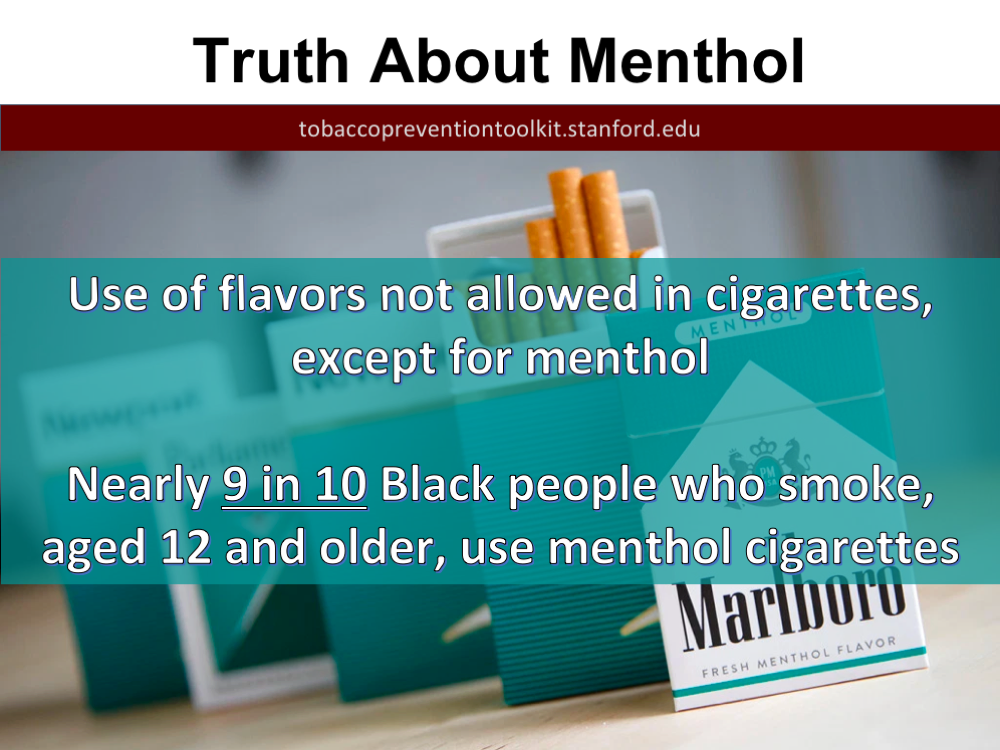





The Truth About Menthol Copy
Flavored cigarettes have been banned since 2009, but Big Tobacco fought to keep menthol as a legally allowed flavor. This is a problem for lots of reasons.

Studies show that menthol cigarettes lead to more young people starting to smoke, are easier to get addicted to, and are harder to quit than unflavored cigarettes.
To make matters worse, menthol tobacco products have been advertised in the Black community for decades. Tobacco companies are known to have given out free cigarettes in Black neighborhoods, events, and venues, hoping they would be able to hook customers.
Click on the “i” icons to read more details below.
To this day, menthol tobacco products are more likely to be advertised in Black communities and in publications with a large Black following. This makes it clear that tobacco companies really want to hook the Black community with their products and keep them hooked.
Something to Think About
It is incredibly important that Black people, and other people of color, are represented in movies, magazines, and other media. But, it’s a different story when the product that is being sold is addictive and deadly.
It is even more frustrating to see how the Black community is targeted by tobacco companies when you know that smoking is a major cause of heart disease, the number one cause of death for people who are Black. Watch the video below to see spoken word artist SixFootah The Poet‘s take on menthol.
Video Credit: Campaign for Tobacco-Free Kids
Reference(s):
- Babb, S., Malarcher, A., Schauer, G., Asman, K., & Jamal, A. (2017). Quitting Smoking Among Adults – United States, 2000-2015. MMWR. Morbidity and mortality weekly report, 65(52), 1457–1464. https://doi.org/10.15585/mmwr.mm6552a1
- Davis, Ronald M. “The Role of the Media in Promoting and Reducing Tobacco Use: (481902008-001).” American Psychological Association, 2008. https://doi.org/10.1037/e481902008-001.
- Gardiner P. S. (2004). The African Americanization of menthol cigarette use in the United States. Nicotine & tobacco research: official journal of the Society for Research on Nicotine and Tobacco, 6 Suppl 1, S55–S65. https://doi.org/10.1080/14622200310001649478
- Giovino, G. A., Villanti, A. C., Mowery, P. D., Sevilimedu, V., Niaura, R. S., Vallone, D. M., & Abrams, D. B. (2015). Differential trends in cigarette smoking in the USA: is menthol slowing progress? Tobacco control, 24(1), 28–37. https://doi.org/10.1136/tobaccocontrol-2013-051159
- (2013). Preliminary scientific evaluation of the possible public health effects of menthol versus nonmenthol cigarettes. [Rockville, Md.]: Food and Drug Administration.
- Ton, H. T., Smart, A. E., Aguilar, B. L., Olson, T. T., Kellar, K. J., & Ahern, G. P. (2015). Menthol Enhances the Desensitization of Human α3β4 Nicotinic Acetylcholine Receptors. Molecular pharmacology, 88(2), 256–264. https://doi.org/10.1124/mol.115.098285
